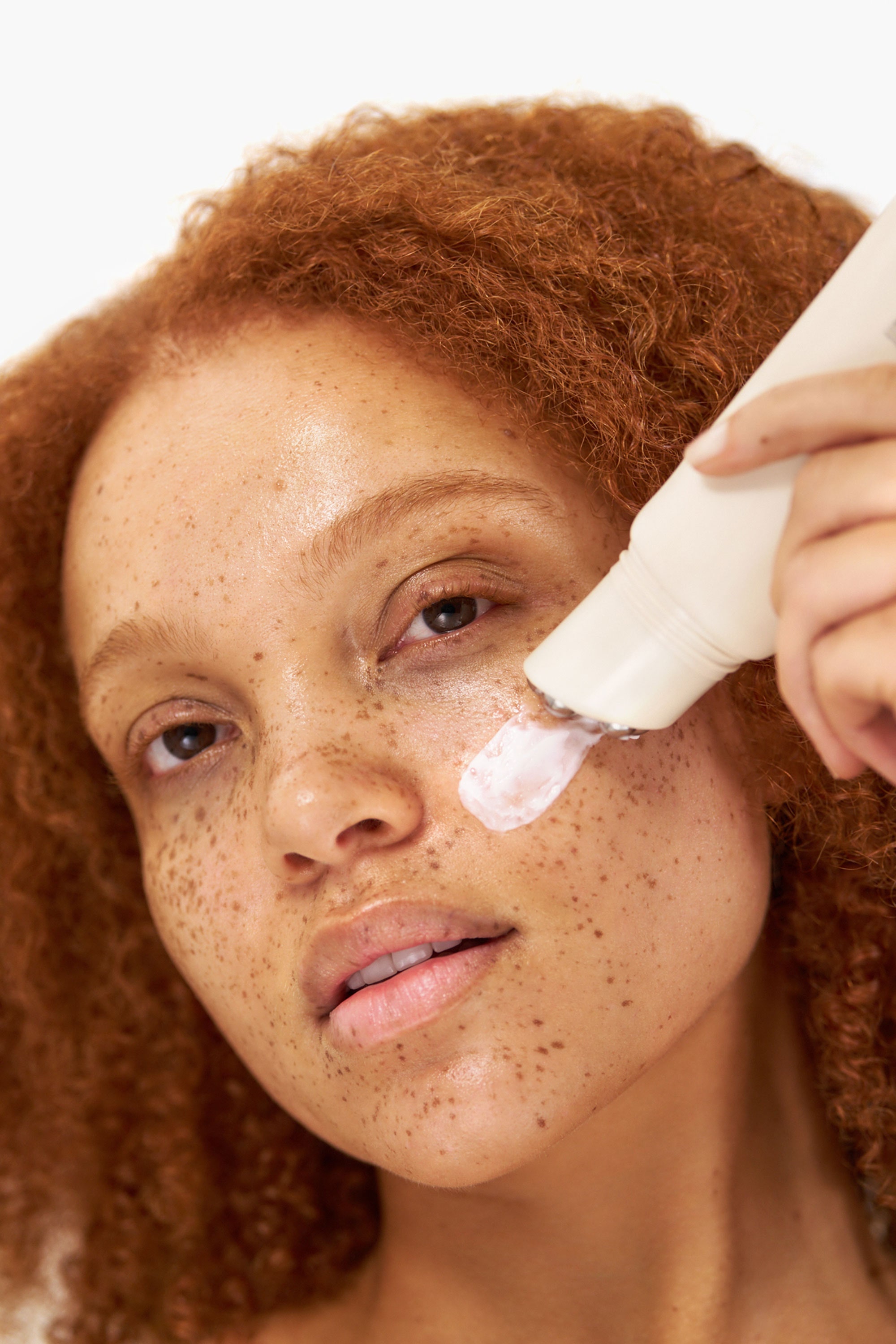Beauty brand Refy is expanding into skincare, introducing a cleanser and moisturiser.
The cleanser, Face Cleanse, retails for £24 in the UK and $32 in the US and is Refy’s solution to allowing consumers to forgo the double cleanse. The moisturiser, Face Sculpt, retails for £38 in the UK and $50 in the US and includes a new patented ingredient designed to lift and sculpt the face.
The UK-based brand was founded in 2020 by influencer Jess Hunt and beauty entrepreneur Jenna Meek. Refy rose to popularity thanks to its viral brow gel and lip gloss, popular among Gen Z on TikTok (particularly those who favour the ‘clean girl’ aesthetic). Skincare is the latest addition to a growing mix of products. In 2022, the brand introduced a bodycare line, and in January 2024, Refy expanded into fashion with a limited-edition drop of T-shirts, hoodies, accessories and lifestyle items. In December, the brand also launched Refy World, a members club-style rewards programme that grants customers early access to products, events and more.
From September 2024 to August 2025, the brand is expecting around £100 million in sales, up roughly 60 per cent year-on-year. The brand is stocked in Sephora and Selfridges. Wholesale represents 55 per cent, while direct-to-consumer accounts for 45 per cent, according to FY25 forecasts. The US is the biggest market for Refy, representing 50 per cent, while the UK represents 30 per cent, the Middle East accounts for 10 per cent and the EU represents 9 per cent.
The skincare market is a difficult one to crack: consumers are more educated than ever on the science of skincare, ingredients and product formulations. We spoke to Meek about how Refy is hoping its skincare launch will stand out.
Vogue: Why is Refy launching skincare?
It was a natural step for us. We’re always looking for the perfect prep to go alongside our makeup products. We’ve got some prep products within our current range, and especially in the US, our primers have been successful and customers have been really excited by an ingredient-led skin-based [beauty] product.
When we first started developing beauty product for Refy, our mission was to simplify beauty and break through a super crowded and overwhelming market — which I feel skincare is as well. We’ve tried to keep the skincare really simple for the consumer, so it’s a two-step process, and the products are packed with amazing ingredients.
Vogue: What can Refy customers expect from the two products?
The products are performance-led and give instant results as well as having long-term benefits which we’re tracking through user trials. With the cleanser, we wanted it to do multiple steps in one. So it removes 100 per cent of makeup and cleanses the skin without stripping the skin [so the user wouldn’t need to double cleanse]. We’ve got glycerin in it and other emollients in it that remove makeup, SPF and impurities. We’ve also got a new performance-led ingredient that’s like an instant active; it moisturises in 30 seconds. There are a lot of active ingredients in cleansers on the market, but because you wash it off, they don’t have time to get into the pores and actually do anything.
The moisturiser is for day and night. It’s got a new patented ingredient called Insta-tight that the product team went to South Korea to develop with a factory that we work really closely with. It acts in 30 seconds to pull on the face to lift and firm without feeling too tight. We’re seeing a real instant lift from the community trials; it’s really visible. There are also ingredients that moisturise the skin long-term like glycerin and provitamin B5 [known as pantothenic acid]. The applicator comes with metal balls so you have the face tool element as you’re applying.
Vogue: Consumers have increasingly high expectations of skincare products. How has Refy found it navigating the market?
It’s a difficult [category] to crack and gain the trust of the customer. We’re a beauty brand, but we’ve always kept things simple with real performance-led products and a simple routine, and we’ve worked really hard to educate our marketing team on simplifying the messaging to what the consumer really needs to know in terms of how ingredients work and what they do. The team has actually shot the community trials to go into a campaign to sell the product. With skincare, it can be difficult to see the results compared to a lip product or colour cosmetics, which are quite visible, but I think the way it’s been shot will help in terms of education. We’ve got sampling products that we’ll use in our in-person events and activations around the time of the launch to get it into as many hands as possible and show that the results are really credible.
Vogue: How does creating and selling a skincare product differ from makeup?
It takes a lot more testing from the product team really early on in terms of working with dermatologists and understanding the field a bit more. Innovation is what drives every product, no matter what category, especially as the market can be overwhelming. Our product team works super hard to find the gaps and pain points from our community. We’re constantly asking what customers are finding difficult or what they’re missing in their routines, then trying to think of how to incorporate the solution in as few products as possible.
It’s also different in terms of how you sell it. We did really worry about how we were going to bring it to market — our customer loves an instant result and before-and-afters do really well for us — so it was about understanding how to get the results across to our customer.
Vogue: What did you learn from the fashion launch?
When we launched fashion, it was to explore a lifestyle offering and reach a different type of audience. We did it as a limited-edition collection around a mascara launch, and the strategy was to test and learn. With beauty and skin products, the lead time is a lot longer, whereas lifestyle pieces are quicker to develop, so it’s about finding the right time. I think if we ever did a fashion launch again, it would be interesting in the future to do it on its own rather than launching it with a beauty product to make sure each side has its own time to shine. We’re planning to bring the fashion and lifestyle piece into Refy World, too, because we’re constantly getting requests from people asking if they can still buy the hoodies or T-shirts.
Through TikTok, Jess Hunt and Jenna Meek catapulted their beauty brand into the consciousness of Gen Z consumers. Now, they want to build longevity.

Vogue: Tell me more about the Refy World launch.
Refy World is our new members hub that we just launched [in December]. It’s a digital space that brings together our online experiences with our in-person experiences to give customers more access to upcoming events and exclusive experiences based on how many orders you’ve placed with us. People will be able to get invited to our events before anyone else. When we’ve done some tests, a lot of the community wants to be involved in exclusive tests of products, so we’ve been working with the product team on how we can bring that in.
Vogue: What’s next for Refy?
We’re always looking at what’s next. We don’t necessarily look at categories but instead routines or products that fill the gap. Next year, we’ll have a massive community focus to get feedback on what customers want from us.
Comments, questions or feedback? Email us at feedback@voguebusiness.com.
